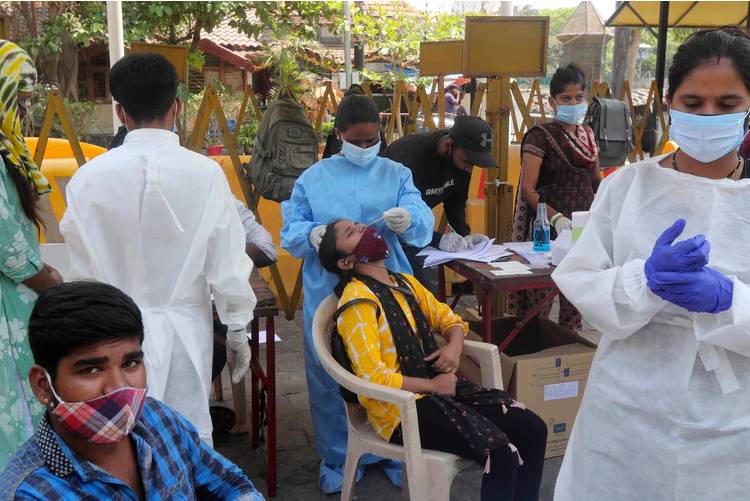India reported a record number of COVID-19 deaths in a single day Saturday, and a more contagious variant is partly to blame, the World Health Organization's chief scientist said.
In an interview Saturday with AFP, Soumya Swaminathan warned that "the epidemiological features that we see in India today do indicate that it's an extremely rapidly spreading variant."
Swaminathan said the B.1.617 variant of the coronavirus that causes COVID-19 was clearly a contributing factor to the catastrophe in India, her homeland.
"There have been many accelerators that are fed into this," the 62-year-old pediatrician and clinical scientist said, stressing that "a more rapidly spreading virus is one of them." She added, however, that large gatherings and a lapse in mask-wearing also played a role.
The B.1.617 variant was first discovered in India last October. The U.S. and Britain consider it a “variant of concern,” which indicates it is more dangerous than the original virus.
The number of cases and deaths are horrifying on their own, but Swaminathan said the additional danger was the increasing likelihood of variants that could outwit vaccines.
"Variants which accumulate a lot of mutations may ultimately become resistant to the current vaccines that we have," she warned.
India’s health ministry Saturday reported more than 401,000 new COVID-19 infections and nearly 4,200 deaths in the previous 24-hour period, although public health experts believed the actual numbers were likely much higher.
Lockdowns spreading
More of India's states imposed stringent lockdown measures in the absence of a national lockdown plan.
The southern state of Tamil Nadu said it would shift from a partial to a full lockdown after neighboring Karnataka state extended a full lockdown Friday.
India’s main opposition leader, Rahul Gandhi, urged Prime Minister Narendra Modi on Friday to implement a national lockdown, accelerate the vaccination campaign and increase tracking of the virus and its mutations.
“Allowing the uncontrollable spread of the virus in our country will be devastating not only for our people but also for the rest of the world,” Gandhi said to Modi in a letter.
EU summit, criticism of US
On the second day of a European Union summit in Portugal on Saturday, the EU approved a contract extension with Pfizer-BioNTech to provide up to 1.8 billion additional doses of its vaccine through 2023.
Pfizer-BioNTech has already provided the EU with 600 million doses, as required in the initial contract.
Also at the EU summit, the U.S. faced mounting criticism from EU leaders about U.S. President Joe Biden’s surprise endorsement earlier this week of lifting COVID-19 vaccine patents to make more doses available to poorer countries.
“We don’t think, in the short term, that it’s the magic bullet,” said EU Council President Charles Michel.
Michel and other EU leaders said the U.S. should instead start boosting U.S. vaccine exports to have maximum impact on the global pandemic.
“I’m very clearly urging the U.S. to put an end to the ban on exports of vaccines and on components of vaccines that are preventing them being produced,” French President Emmanuel Macron said.
The U.S., like Britain, has limited exports of domestically developed vaccines so it can vaccinate its population first. The EU has become the world’s leading vaccine provider, distributing about 200 million doses to the 27-nation bloc and roughly an equal number to nearly 90 countries around the world.
Pope Francis said he supported the temporary suspension of vaccine patents, according to news reports. He added that market forces, as they relate to the vaccines, must not predominate.
WHO approves Sinopharm vaccine
The World Health Organization on Friday approved a COVID-19 vaccine developed in China for emergency use worldwide.
The vaccine, from China’s state-owned drugmaker, Sinopharm, is the first vaccine manufactured by a non-Western country to be endorsed by WHO.
Empty vials of China's Sinopharm vaccine sit in a cup during a priority COVID-19 vaccination campaign of health workers at a…
FILE - Empty Sinopharm vaccine vials sit in a cup during a priority COVID-19 vaccination campaign of health workers at a public hospital in Lima, Peru, Feb. 10, 2021.
WHO’s decision allowed the Sinopharm vaccine to be included in the COVID-19 Vaccines Global Access, or COVAX, an initiative to distribute vaccines to mainly low-income countries.
North American numbers
In Washington, the White House COVID-19 Response Team said Friday that its focus was on meeting Biden’s new goal of fully vaccinating 160 million Americans by July 4, as infections, hospitalizations and deaths continued to decline.
The Centers for Disease Control and Prevention reported that as of Saturday, 151,315,505 people had received at least one dose of a COVID-19 vaccine and 112,626,771 had been fully vaccinated.
At the team's briefing, White House COVID-19 Response Coordinator Jeff Zients said that to help meet Biden's goal, the government would make walk-up, no-appointment shots available at 20,000 pharmacies around the country. The Federal Emergency Management Agency will also be shipping vaccines from high-volume vaccination centers around the country to smaller community-based sites, where they are more in demand.
The COVID-19 pandemic has claimed nearly 3.3 million lives around the world, according to the Johns Hopkins Coronavirus Resource Center. The U.S. has suffered the most deaths, with more than 581,000. Brazil is second with more than 421,000 deaths, followed by India, with more than 238,200 deaths.
There have been more than 157 million global infections, according to Johns Hopkins. The U.S. has the most, with more than 32.7 million, followed by India, with nearly 21.9 million infections, and Brazil, with more than 15 million.
(VOA)

